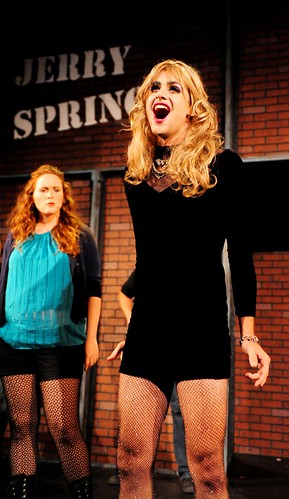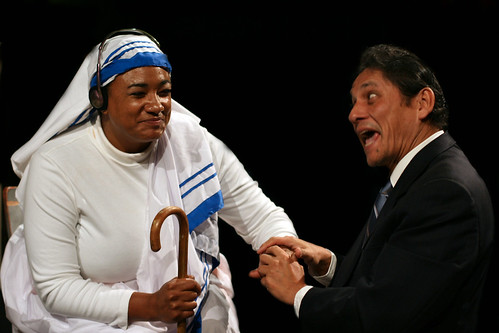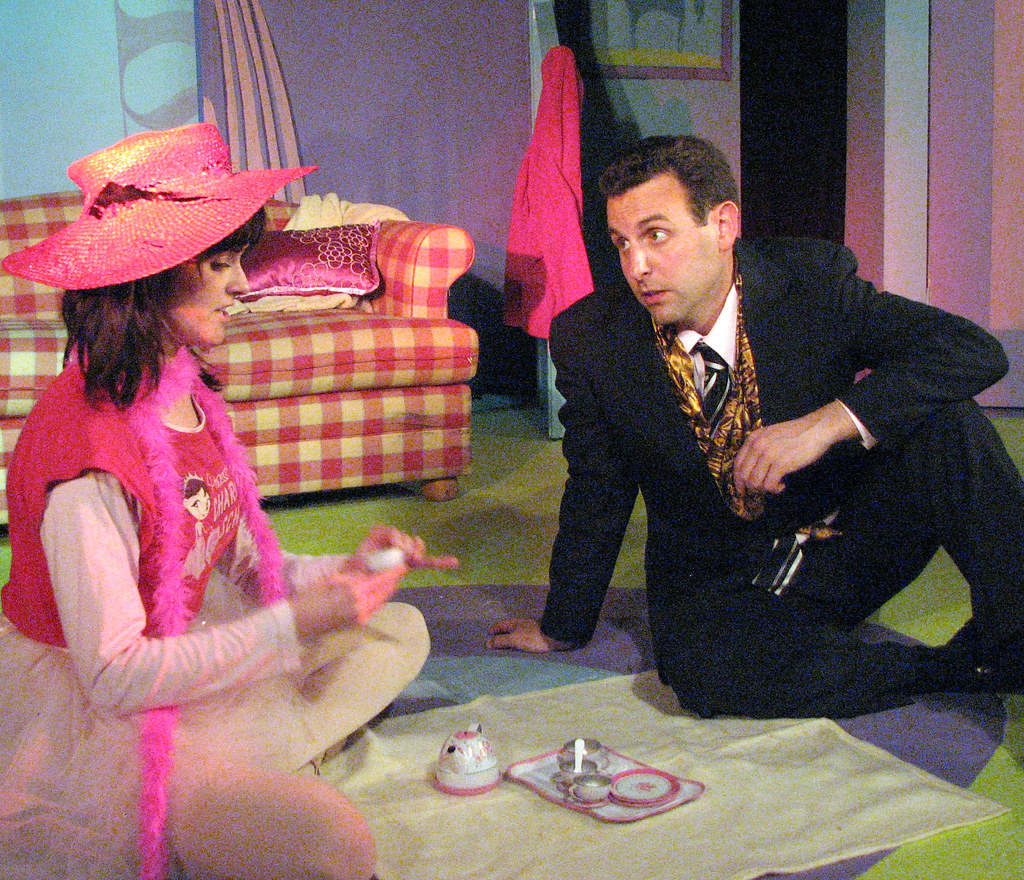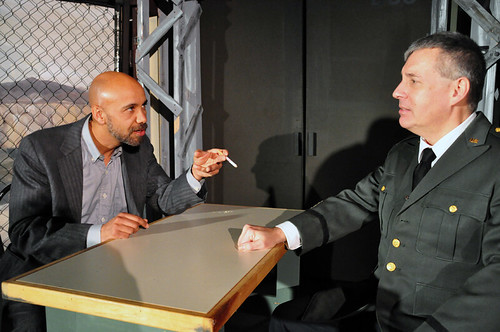Timitio Artusio as Treymont (front) and Jordan Best as Zandra, both guests on “The Jerry Springer Show” in Jerry Springer the Opera at the Victoria Theatre. Photo by Ben Krantz Studio
Below: Brandy Leggett is Mother Teresa and Ben Ortega is a prosecuting attorney in The Last Days of Judas Iscariot at the Gough Street Playhouse. Photo by Jamie Buschbaum
There are some wonderfully theatrical theological discussions going on around town these days.
At the Victoria Theatre in the Mission, outlandish talk show host Jerry Springer is facilitating a conflict resolution session between Satan and Jesus in Ray of Light Theatre’s Jerry Springer the Opera.
And the Custom Made Theatre Company is delving deep into notions of Judeo-Christian forgiveness and despair in Stephen Adly Guirgis’ The Last Days of Judas Iscariot. Satan and Jesus make appearances in this show, too.
Jerry Springer is a mammoth undertaking for Ray of Light, and the results are pretty spectacular. I don’t love the show, which whisks us from the set of The Jerry Springer Show to the bowels of hell, but I admire the way it lends operatic grandeur to lives we too casually condemn as trailer trash.
M. Graham Smith’s production features a cast of more than 40 plus an eight-piece band, and the music, especially the choral blasts, is the best part of this nearly three-hour blast of foul language, bad behavior and humorously serious reflections on the worst (and marginally best) of human nature.
Music Director Ben Prince has accomplished some magnificent things with his singers and band – even when the show gets repetitive, the score by Richard Thomas (music and lyrics) and Stewart Lee (book and lyrics) is always interesting. You don’t exactly go out humming any of the melodies, but the blend of opera and show tune is mighty appealing.
For all of its shock (and schlock) value, Jerry Springer the Opera really is trying to jolt us into the realization that we’re all on this sinking ship together, and if we go down throwing chairs at each other and infecting everyone with our filth, we can’t fall into the drink quickly enough. But hey, at least we go down singing.
In place of glorious choral music, The Last Days of Judas Iscariot is filled with a wondrous wash of words. This play is a whole lot of talk – nearly three hours’ worth – mostly because Guirgis utilizes the crusty old narrative tool of a trial.
The setting is purgatory – here a city very much like New York – and the trial concerns the fate of Judas, who has been condemned to eternal damnation for his betrayal of Jesus. The audience sits in jury boxes on three sides of the stage in the newly reconfigured Gough Street Playhouse (formerly The Next Stage).
Unfortunately, we the jury don’t get to vote on whether the prosecution (Ben Ortega as the unctuous El-Fayoumy) has made a convincing argument that Judas got what he deserved or whether the defense (Edith Reiner as the Irish/Gypsy Cunningham) has proved that Judas was part of a larger plan, that others acted more harshly than he did or that his attempt to recant makes his offense less damning.
Custom Made’s artistic director, Brian Katz, orchestrates this sprawling play with aplomb. He also appears an Everyman whose moving monologue attempts to link Judas’ actions with our contemporary lives.
This is actually a play masquerading as a bible study class for those of us with limited knowledge of the bible and its key players. That’s not necessarily a bad thing. Guirgis is an entertaining writer who is able to engage and inform. He adheres to the trial structure but breaks out with scenes involving, for instance, a streetwise Saint Monica (Corrine Elizabeth Proctor), a Mary Magdaelne (Amelia Avila) bent on setting the record straight and a childhood friend of Judas’ (Perry Aliado as Matthias of Galilee).
Lewis Campbell plays both the trial judge (a Confederate deserter) and Caiaphas and does well with both, especially the latter, the man often blamed for Jesus’ death. But the show is stolen, at least for a few minutes, by Brandy Leggett as a wily Mother Teresa.
I must admit to a low tolerance for biblical tales, but Guirgis held my interest for most of the play. He made me care about Judas (played with intensity by Kristoffer Barrera) and question what he represents in our culture. If Stephen Adly Guirgis were going to teach bible study class regularly, I might actually show up.
FOR MORE INFORMATION
Ray of Light Theatre’s Jerry Springer the Opera continues through October 16 at the Victoria Theatre, 2961 16th St., San Francisco. Tickets are $25-$36. Visit www.jerrysf.com for information.
Custom Made Theatre Company’s The Last Days of Judas Iscariot continues through Oct. 30 at the Gough Street Playhouse,1620 Gough St., (at Bush Street), San Francisco. Tickets are $20-$30. Visit www.custommade.org for information.








